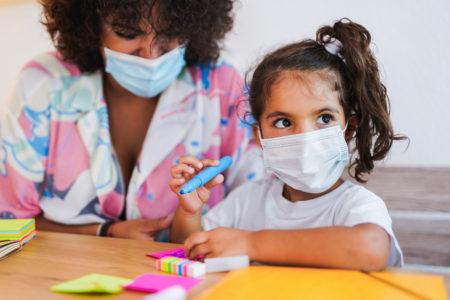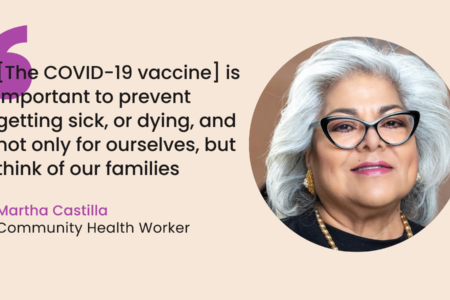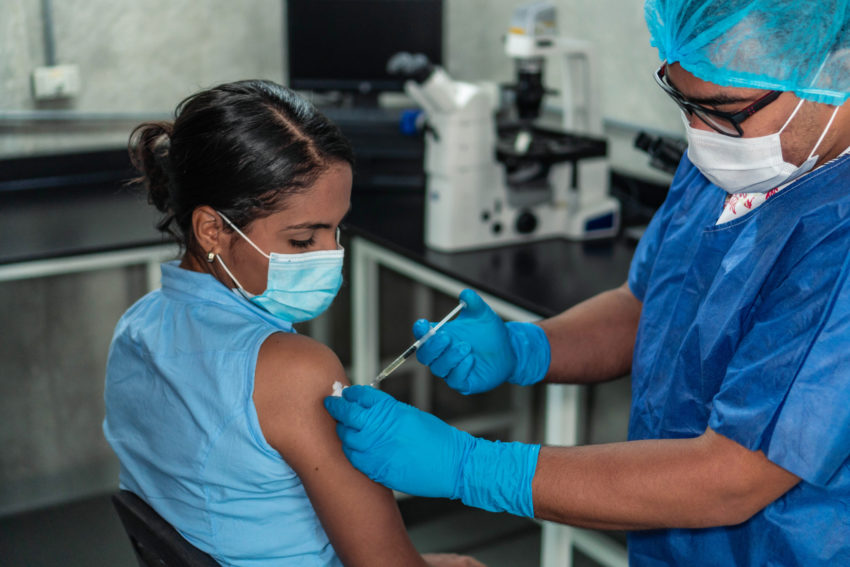
Share On Social!
As the American people still grapple with the COVID-19 pandemic, medical experts are now in the process of distributing a booster shot, which many say can help.
The booster shot is critical in making headway with bringing the pandemic to an end, according to Dr. Anthony Faucci, the Director of the National Institute of Allergy and Infectious Diseases and the Chief Medical Advisor to the President.
“I’ve made it clear that my opinion has always been that I believe that a third-shot booster for a two-dose mRNA [vaccine] should ultimately and will ultimately be the proper, complete regimen,” he said in a recent interview with The Atlantic. “The vaccine is very successful. The durability of it is something that’s a subject of considerable discussion and sometimes debate.”
As the booster shot becomes more available, it will be critical for Latinos and all Americans to do their part in ending the COVID-19 pandemic.
Update: Thursday, September 1, 2022
The CDC has recently endorsed the Advisory Committee on Immunization Practices’ (ACIP) recommendations for the updated COVID-19 boosters from Pfizer-BioNTech for people ages 12 years and older and from Moderna for people ages 18 years and older.
According to the CDC, the updated COVID-19 boosters add Omicron BA.4 and BA.5 spike protein components to the current vaccine composition, helping to restore protection that has waned since previous vaccination by targeting variants that are more transmissible and immune-evading.
“The updated COVID-19 boosters are formulated to better protect against the most recently circulating COVID-19 variant. They can help restore protection that has waned since previous vaccination and were designed to provide broader protection against newer variants. This recommendation followed a comprehensive scientific evaluation and robust scientific discussion. If you are eligible, there is no bad time to get your COVID-19 booster and I strongly encourage you to receive it,” said Dr. Rochelle Walensky, CDC Director.
In the coming weeks, the CDC also expects to recommend updated COVID-19 boosters for other pediatric groups. The CDC will quickly move to help make them available in the United States once data are available and FDA authorizes these other types of COVID-19 boosters, the CDC reported.
“The Food and Drug Administration’s (FDA) authorization of updated COVID-19 boosters, and CDC’s recommendation for use, are critical next steps forward in our country’s vaccination program—a program that has helped provide increased protection against COVID-19 disease and death,” the CDC said.
The CDC recommends that everyone stay up to date with COVID-19 vaccination, including all primary series doses and boosters for their age group.
Previously, the CDC recommended COVID-19 vaccines for everyone 6 months or older and boosters for those 5 years of age and older, if eligible.
For more details regarding doses and boosters for specific age groups, visit the CDC’s webpage.
Update: Thursday, Sept. 30, 2021
As medical experts work to fight back the COVID-19 Delta variant, the CDC released new vaccine guidelines that a third booster shot will be necessary.
The CDC recommends that a booster shot be implemented eight months after the second dose of the COVID-19 vaccine to provide “long lasting protection.”
The booster shot is expected to roll out the week of Sept. 20, 2021.
More than anything, health experts say this third dose will go a long way in maximizing vaccine-induced protection and prolonging its durability, according to CDC Director Dr. Rochelle Walensky.
“Our top priority remains staying ahead of the virus and protecting the American people from COVID-19 with safe, effective, and long-lasting vaccines especially in the context of a constantly changing virus and epidemiologic landscape,” Walensky said. “We will continue to follow the science on a daily basis, and we are prepared to modify this plan should new data emerge that requires it.”
Facts about the COVID-19 Booster Shot
The COVID-19 vaccines are remarkably effective in reducing risk of severe coronavirus disease, hospitalization, and death, even against the widely circulating Delta variant.
“We know that even highly effective vaccines become less effective over time,” Dr. Vivek Murthy, the surgeon general, said at a White House briefing. “It is now our clinical judgment that the time to lay out a plan for COVID boosters is now.”
Still, the CDC says that many vaccines experience a reduction in protection over time — making it less effective. This is why experts are now calling a booster shot necessary.
“The available data make very clear that protection against SARS-CoV-2 infection begins to decrease over time following the initial doses of vaccination, and in association with the dominance of the Delta variant, we are starting to see evidence of reduced protection against mild and moderate disease,” Walensky said.
“Based on our latest assessment, the current protection against severe disease, hospitalization, and death could diminish in the months ahead, especially among those who are at higher risk or were vaccinated during the earlier phases of the vaccination rollout.” 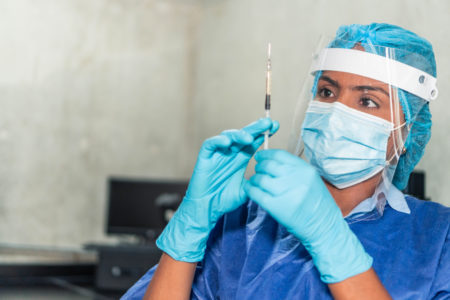
As researchers continue to study the vaccine and its effects, data show the only way to ensure long-term protection is through a third dose. This will prolong protection and safety for the vaccinated.
The booster shot is currently under independent evaluation by the FDA.
This review will determine the safety and effectiveness of a third dose of the Pfizer and Moderna mRNA vaccines.
They also say the Johnson & Johnson vaccine will also most likely require a booster.
Following approval, the CDC’s Advisory Committee on Immunization Practices will issue booster dose recommendations based on a thorough review of the evidence, starting as early as late September 2021.
“We are prepared to offer booster shots for all Americans. At that time, the individuals who were fully vaccinated earliest in the vaccination rollout, including many health care providers, nursing home residents, and other seniors, will likely be eligible for a booster,” Walensky said.
“We would also begin efforts to deliver booster shots directly to residents of long-term care facilities at that time, given the distribution of vaccines to this population early in the vaccine rollout and the continued increased risk that COVID-19 poses to them.”
Why Latinos Should Be Ready for the COVID-19 Booster Shot
Coronavirus cases are on the rise again—despite vaccines being widely available—due to the Delta variant, which is a mutation of COVID-19
This variant is highly contagious.
“The Delta variant is the fastest, fittest and most formidable version of the coronavirus that causes COVID-19 the world has encountered, and it is upending assumptions about the disease even as nations loosen restrictions and open their economies, according to virologists and epidemiologists,” according to Reuters.
Latinos are at high risk of contracting the delta strain due to low vaccination rates in Latino communities.
Latinos make up a low percentage of those getting vaccinated in each state, according to data from state health departments. 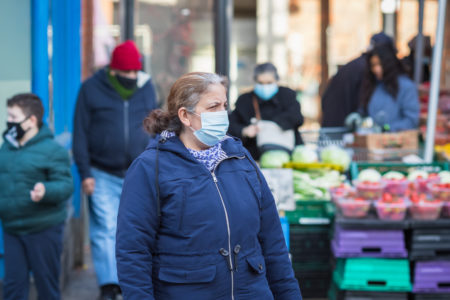
“Only a quarter of the Hispanic population had received a vaccine as of June 28, according to the Kaiser Family Foundation. By this time, White and Black populations in Colorado were well ahead, with vaccination rates of 44% and 58% respectively. With Delta ravaging through unvaccinated communities, it is concerning for Latinos that 75% of all new cases in the state are traced to the more transmissible variant,” writes Oscar López for Al Día News.
Latinos have also been targeted by myths and misinformation about the vaccine, which contributes to low vaccine uptake and confidence.
Still, the CDC continues to work toward building confidence in the COVID-19 vaccine, as well as the new booster shot.
“We also want to emphasize the ongoing urgency of vaccinating the unvaccinated in the U.S. and around the world,” CDC Director Walensky said. “Nearly all the cases of severe disease, hospitalization, and death continue to occur among those not yet vaccinated at all.
“We will continue to ramp up efforts to increase vaccinations here at home and to ensure people have accurate information about vaccines from trusted sources.”
How to Build Confidence for COVID-19 Vaccines, Booster Shots
CDC experts say that the evidence for building trust in the vaccine and this new booster shot is in the data.
“Based on our latest assessment, the current protection against severe disease, hospitalization, and death could diminish in the months ahead, especially among those who are at higher risk or were vaccinated during the earlier phases of the vaccination rollout,” Walensky said.
“For that reason, we conclude that a booster shot will be needed to maximize vaccine-induced protection and prolong its durability.”
Not only are experts recommending this, but Latinos and many other people across the U.S. are urging their community to step up and get vaccinated, such as:
- Chris David: Get the Vaccine So Business Can Go Back to Normal!
- Emelina Asto-Flores: Participant in a COVID-19 Vaccine Clinical Trial to Help Latinos!
- Alfred Lee: Get the Vaccine So You Can Go Fishing!
- Nelly Jiménez: Get the COVID-19 Vaccine to Protect Your Family, Community!
Moreover, we can do our part to help Latinos.
Fight the spread of COVID-19 by sharing resources to educate our communities and learn the facts about the pandemic. Make sure you know misinformation when you see it and help educate others about the facts.
Read Jesus Larralde’s vaccine change of heart story in English and Spanish
If you or anyone you know is still hesitant about getting vaccinated, read these Salud America! stories. They feature real Latinos who had a #VaccineChangeofHeart and decided to get the shot after initially being hesitant.
You can also check out the “Juntos, We Can Stop COVID-19” digital communication campaign from Salud America! at UT Health San Antonio. This campaign helps Latino families and workers take action to slow the spread of COVID-19.
The #JuntosStopCovid campaign features culturally relevant fact sheets, infographics, and video role model stories to encourage Latinos to change their public health behaviors.
You can share the campaign with your friends, family, and colleagues!
By The Numbers
142
Percent
Expected rise in Latino cancer cases in coming years

